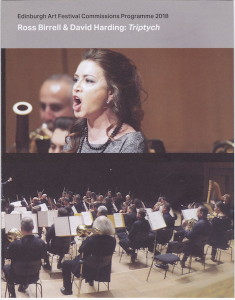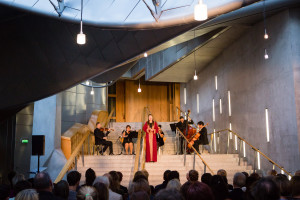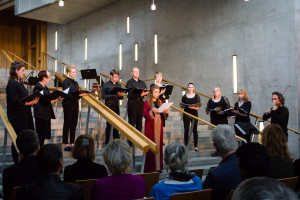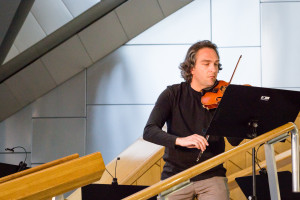
Ross Birrell & David Harding: Triptych Since 2005, Ross Birrell and David Harding have collaborated on several films and installations which increasingly explore the poetic and political dynamic of music. Triptych, their new work for Edinburgh Art Festival in the historic context of Trinity Apse, is, as the title suggests, tripartite in structure, producing a space where moving image, colour and music correspond and resonate with historical and contemporary architectural, poetic and political contexts. At the heart of Triptych is a three-channel film documenting a performance of Henryk Gorecki’s Symphony No. 3: Symphony of Sorrowful Songs (1976) in the Megaron Concert Hall, Athens. Conceived for documenta 14, the concert was performed by the Athens State Orchestra with the Syrian Expat Philharmonic Orchestra (founded in 2015 by Raed Jazbeh) and featuring Syrian soprano, Racha Rizk. Gorecki’s Symphony of Sorrowful Songs is a moving lament, reflecting the experience of loss as a result of war. A sense of separation and absence pervades the film installation. A central screen documents a wide view of the orchestra and conductor, Daniel Raiskin, while two side panels appear to focus upon an empty space – a space which awaits the solo performance of Rizk. Rizk recites a 15th century lament from the Songs of Lysagora. Sited in the remnants of a 1Sth church, this is one of several contexts that permeate Birrell and Harding’s Triptych. ln its formal presentation, the film references another triptych – Hugo Van der Goes’ Trinity Altarpiece (1478-79), painted for the original Trinity Church and now housed in the National Gallery of Scotland. Alongside Gorecki, the Athens concert also included a performance of Fugue, a project developed by Ross Birrell in collaboration with the Syrian composer and violinist, Ali Moraly. Fugue shares the same etymology as refugee, and in an echo of the subject and countersubject which characterizes contrapuntal fugal form, an initial theme was sent by Birrell to Moraly inviting a response which ultimately took the form of Moraly’s Quatrain for Solo Violin after Paul Celan’s Death Fugue. The scores which combine to form Fugue are exhibited as part of Triptych. Visitors to Trinity Apse will be met by an infusion of colour emanating from new compositions created in reds and blues for windows long devoid of their original stained glass. These chromatic mosaics are based on fragments of a further music score which has its origins in lines by the Palestinian poet, Mahmoud Darwish, whose words are transposed into a twelve-tone musical notation and corresponding numerical grid, and subsequently translated into fields of red and blue colour tones. The complex transposition of forms enacted inTriptych – live recital into film, poetry into music, music into colour – corresponds to wider cultural conditions of exile, migration, displacement and fragmentation; and finds echoes in the architectural fabric of Trinitv Apse itself. Trinity Apse is all that remains of the original Trinity Collegiate Church, taken down in 1848 to make way for Waverley Train Station. In an early example of heritage conservation, the stones were numbered with a view to rebuilding the church on an alternative site. Some 30 years later fragments of the choir and a transept were re-erected on the current site to form Trinity Apse. Still bearing evidence of their painted numbers, a visible testament to their displacement and re-siting, the stones of Trinity Apse provide a fitting context for a work reflecting on loss, trauma and exile
‘Keep me like the echo’
A special performance devised by artists Ross Birrell and David Harding for the Scottish Parliament, Saturday 26 August, 6-8pm.
In the final weekend of Edinburgh Art Festival, artists Ross Birrell and David Harding invite Syrian composer and violinist Ali Moraly, soprano Racha Rizk and musicians of the Damascus String Quintet (of the Syrian Expat Philharmonic Orchestra – SEPO) to present a live performance in association with their new artwork for Edinburgh Art Festival.
The concert will feature Ali Moraly performing Quatrain for Solo Violin after Paul Celan’s Death Fugue, a four-part musical work composed for Fugue, a project devised by Moraly and Birrell in response to the shared origins of the words ‘fugue’ and ‘refugee’. In addition, the musicians will perform a selection of works from both Western classical and Syrian traditional music repertoire.



The concert is presented with the support of: the Scottish Government’s Festivals Expo Fund, EventScotland, British Council Scotland, and the Scottish Parliament.
About the artwork:
During their 12 year collaboration, Scottish artists Ross Birrell and David Harding have explored the thresholds between music and politics, poetry and place, composition and colour. Their new project Triptych, made for our 2018 Festival reflects on themes of flight and dispossession through a film installation in the historic setting of Trinity Apse, located in Chalmers Close just off Edinburgh’s High Street. The 3 channel film documents a powerful recital of Henryk Gorecki’s 1976 Symphony No 3: Symphony of Sorrowful Songs, initiated by the artists for documenta 14 and performed in Athens by the Athens State Orchestra with the Syrian Expat Philharmonic Orchestra (SEPO), featuring Syrian soprano Racha Rizk.
Triptych, Trinity Apse, Chalmers Close, 42 High Street, EH1 1SS
26 July – 26 August 2018